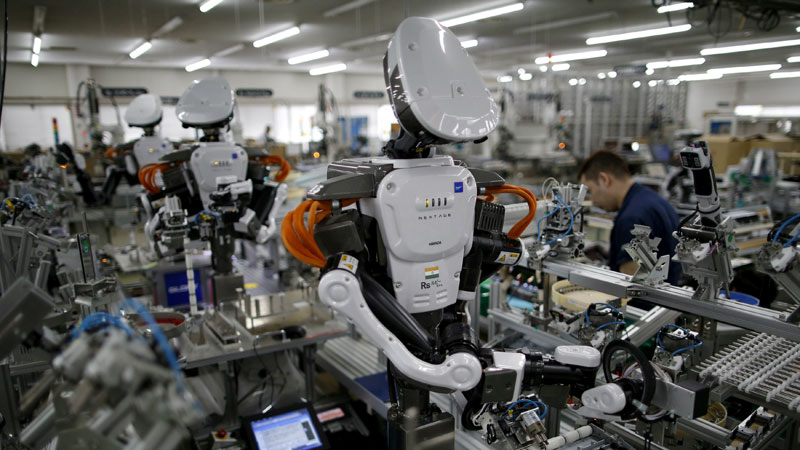The word Doppelgänger means, an apparition or double of a living person.
When you email someone through LinkedIn, you get “response choices” that you can click on. They do a great job replying to someone, usually with a one to three word response.
Cool, I don’t have to type.
Here is a screenshot from one of my email conversations.

I’ve noticed myself using this tool without even thinking about it. When I did think about it, I wondered…does the person on the receiving end realize that I didn’t type that response and do they even care?
Ask yourself, is this something you have noticed or even questioned? I bet many people haven’t and use “response choices” all the time.
I’ve noticed that my phone has started telling me good morning and shows me an ad of something I might be interested in. My phone didn’t do this a few weeks ago.
I recently was looking at a couple of books on Amazon that I was interested in and the next morning, my phone asked me if I was interested in reading one of these books.
Cool, now I don’t have to remember which books I was looking at.
Then I said, “Alexa, order “Autonomous Technology: Technics-out-of-Control as a Theme in Political Thought” by Langdon Winner.”
Alexa: “would you like that delivered on your Amazon Prime account to the address on file?”
“Yes, Alexa.”
Alexa: “Your order has been processed, your expected delivery date is May 24th.”
“Thanks Alexa.”
Alexa: “You’re welcome”
Cool, I didn’t even have to go to Amazon and find the book or remember to order it.
I’m have a meeting with someone new I’ve met on LinkedIn
Before, I meet with this person, I’ll run a psychological profile on them using their LinkedIn account.
I pull open their page and click on my bot.
I now have their personality and character traits, as well as how to approach them in a conversation, what motivates them, what drains them, how to work with them in a meeting and how to convince them of something.
I can even see a graph of their personality type and what the interpersonal dynamic chemistry between us is most likely to be.
Some of the things, from one of the actual profiles I’ve run;
John is primarily driven by logic: Accurate, task-oriented, cautious, and logical in decision-making.
In a Meeting with John:
Be prepared with facts and data to support your agenda. Send John a checklist before the meeting and promptly finish when the items have been completed.
To Convince John:
To convince John, make sure to present facts and data. Send extra information to provide context, and don’t apply pressure (or hard-sell). Present the information in an objective way, and find solutions that minimize risk.
When Working with John:
High standards are a huge part of John’s motivations. John will admire you’re hard work to get things just right and will appreciate and admire you for your work ethic.
Interpersonal Dynamic:
Dave and John are pragmatic executers and will speak to each other in short, clear sentences that may seem robotic at times.
Cool, I’ll Send John a checklist before our meeting, present facts and data along with extra content and keep my answers short and to the point. I won’t push for a hard sell or for him to make a decision and I’ll also keep his profile in front of me during our meeting.
I’m actually busy this afternoon, so I will load John’s psychological profile into my bot and have my bot call him and have a conversation with them.
Oh, I can’t do that yet but it looks like I will be able to soon.
It’s the end of the day and I’m tired but I‘m curious about the meeting earlier today. I’ll put this head gear on and data dump the meeting into my prefrontal cortex. It will only take a few seconds and it will be like I had the meeting. Everything will be stored in my mind.
I unplug after a few seconds. That was a strange meeting and both of us seemed a little cautious and over thinking it. Oh, I know what he did. He used his bot and loaded in my psychological profile and we had a bot to bot meeting. Damn, I hate when people do that.
This is another thing I cannot do right now but will soon be able to.
Keep in mind that this type of technology is in its infancy right now and will continue to develop.
Check out: Replika Really Cool or Creepy Artificial Intelligence
Typing and Using a Keyboard Is So Outdated
You will be saying this in a few years.
Speech to text technology is coming and keyboards and typing will be like using an old fashioned typewriter.
We will start giving our devices voice commands to do searches or get information. As we do, our devices will already know everything about us, what we like, don’t like and what we are interested in, so a lot of the time, it will suggest what we want to look at and read.
Has anyone noticed that video comments on LinkedIn have suddenly become popular?
A Side Note: IFlytek, China’s leading voice recognition tech company isn’t as big as China’s internet giants, but its success and connections are formidable and they are interested in the U.S. market.
This is because text comments are on their way out. We will still be able to use text comments but will soon also have video and speech commenting capability. If we don’t like the way we look or sound, no problem, we will have AI video bots that will look like a real person and sound like a real person and we will even be able to choose how we want it to sound, including having an accent of our choice.
I think this week, I’m going to go with that upscale British accent and change my hair style and color. Oh yeah, a bit of a tan would look nice.
Your digital devices will also have excellent advanced AI face detection and your device will detect your expressions related to your feelings and even ask you if, “you’re okay” or “if it can help?”
Deepfakes – Real Consequences
You will even be able to simulate a family member or loved one who has passed away.
How a Man Turned His Dying Father Into AI
You will be able to become immortal on social media with your self-programmed Doppelgänger, I mean bot.
Check out: What Is A Digital Memorial Service?
I’m busy this week so I will let my bot mingle and meet some new people and or their bots and then I can download everything later.
If I don’t like parts of the conversation, then I’ll delete it from my memory.
A message will warn me that deleting a message or part of a message, will make the message and its data (memory) permanently deleted from my memory.
Damn, I accidentally erased my VR Vacation file and that was one amazing vacation. That’s okay, I can take another two week trip when I get a couple of free hours. Maybe it will be even be better than the last one.
Some of you may be thinking that I‘ve been writing a script for an episode of “Black Mirror.” What I’ve actually been doing is telling you about the future, your future and it’s not that far away.
Here is what Eric Schmidt, then the CEO of Google, said in an interview printed in the Wall Street Journal Internet site in 2010
The day is coming when the Google search box—and the activity known as Googling—no longer will be at the center of our online lives. Then what? “We’re trying to figure out what the future of search is,” Mr. Schmidt acknowledges. “I mean that in a positive way. We’re still happy to be in search, believe me. But one idea is that more and more searches are done on your behalf without you needing to type.”
“I actually think most people don’t want Google to answer their questions,” he elaborates. “They want Google to tell them what they should be doing next.”
Let’s say you’re walking down the street. Because of the info Google has collected about you, “we know roughly who you are, roughly what you care about, roughly who your friends are.” Google also knows, to within a foot, where you are. Mr. Schmidt leaves it to a listener to imagine the possibilities: If you need milk and there’s a place nearby to get milk, Google will remind you to get milk. It will tell you a store ahead has a collection of horse-racing posters, that a 19th-century murder you’ve been reading about took place on the next block.
Says Mr. Schmidt, a generation of powerful handheld devices is just around the corner that will be adept at surprising you with information that you didn’t know you wanted to know. “The thing that makes newspapers so fundamentally fascinating—that serendipity—can be calculated now. We can actually produce it electronically,” Mr. Schmidt says.
Facebook and Mark Zuckerberg Are Developing Brain Control Interfaces
From an article in Apr 19, 2017, on Recode called, “Facebook is developing a way to read your mind”
From the article,
“What if you could type directly from your brain?”
“That was the question Facebook executive Regina Dugan, who runs the company’s secretive research and hardware lab Building 8, posed to the audience Wednesday at the company’s annual F8 developer conference in San Jose.
The question was not meant to be rhetorical. Dugan and Facebook are actually making technology intended to do just that.
Facebook is building what it calls a “brain-computer speech-to-text interface,” technology that’s supposed to translate your thoughts directly from your brain to a computer screen without any need for speech or fingertips.
The idea is that this technology will be able to take what you’re thinking to yourself in silence, using non-invasive sensors that can read exactly what you intend to say, and turn it into readable text.”
The Internet brain-computer speech-to-text interface being developed will be a non-invasive solution.
Just imagine, how great it’s going to be to plug your mind directly into Facebook and feed off of all that negative, hateful mind energy. Maybe, we will be able to do it on LinkedIn and we can connect with all those fabricated profiles and unsociable, piggy backing broadcasters, playing technological and or business digital dress up?
Brain-Computer Interface – Mysteries of the Brain
Elon Musk isn’t just making electric cars and shooting rockets into space, he also owns Neuralink.
According to Neurolinks website,
“Neuralink is developing ultra-high bandwidth brain-machine interfaces to connect humans and computers.”
Elon Musk believes that a human to computer interface is needed because AI will become smarter than humans and could take over.
Here he is talking about it.
Elon Musk Talks On Neuralink: Artificial Intelligence Future of Superhuman Cyborgs?
There is no doubt that generation X and Z are being programmed for this technology but is that a bad thing?
My Questions?
Maybe, Elon Musk is right and we need Neuralink or a brain-computer interface to work towards technological singularity to keep up with advancing AI or maybe this is all going too far?
Could we lose ourselves in this technology and be creating a Cyber Doppelgänger? Is this a good or bad thing?
Since most of the time (over 90%) of human consciousness is actually not conscious and operating on an environmentally programmed subconscious human operating system, could this be an upgrade?
For those of you that still don’t believe humans are machines or becoming cyborgs I have some excellent book recommendations.
The Human Use Of Human Beings: Cybernetics And Society by Norbert Wiener
The Society of Mind by Marvin Minsky
Let those intellectual ideas stimulate your programming with judgment or biases from your intellectually (ego) controlled environmental programming and see what comes in.
These books are not light reading material and to get the full effect you will need to unplug your biased, judgmental programming and its subconscious operating system and let this knowledge assimilate deep in your inner core. That’s the way they were written.
I’m actually writing my own book on this process.
I also highly recommend














